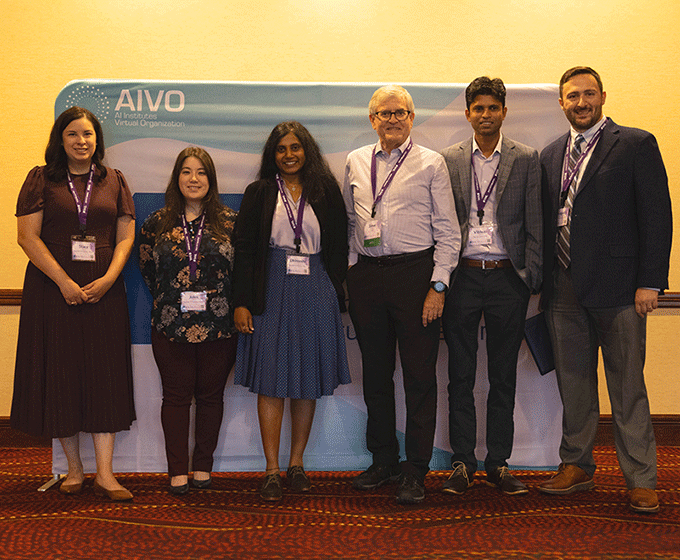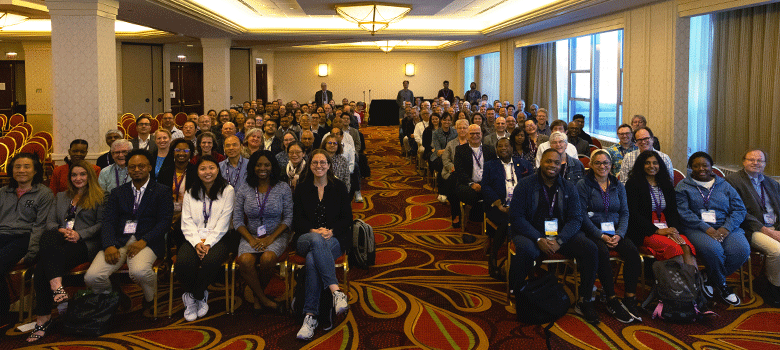
EXAIL organizers from left to right: Stacy Cantu Pawlik, Jules Henry, Dhireesha Kudithipudi, Steve Brown, Vibhuti Gupta and Panos Markopoulos.
OCTOBER 17, 2024 — Researchers at MATRIX: The UTSA AI Consortium for Human Well-Being organized a two-day workshop in Pittsburgh, Pennsylvania, bringing together 100 national leaders in artificial intelligence from the National Science Foundation (NSF) AI Institutes and ExpandAI Institutes.
The ExpandAI Leadership Workshop (EXAIL) was an in-person event funded by NSF to facilitate ideation and collaboration. Participants envisioned the future AI research landscape beyond conventional thinking, furthering the aims of the NSF ExpandAI initiative.
The workshop was held from October 7 to 8, complementing the 2024 NSF Summit for AI Institute Leadership (SAIL) and the subsequent AI Institutes Expo at Carnegie Mellon University. It was supported by the AI Institutes Virtual Organization (AIVO). The synchronicity of the three events was designed to offer participants a wide range of AI leadership experiences in research, education, collaboration and sustainability.
Dhireesha Kudithipudi, MATRIX Director and Robert F. McDermott Endowed Chair, led the design of EXAIL, along with co-PIs Panagiotis “Panos” Markopoulos, Klesse Endowed Professor, and Vibhuti Gupta from Meharry Medical College and lead event coordinator Jules Henry. The team planned the event with funding and guidance from NSF CISE/IIS program managers Jim Donlon and Erion Plaku and the SAIL team, to engage and encourage a broad audience in shaping the future of AI at their home institutions.

100 national leaders in artificial intelligence from the National Science Foundation AI Institutes and ExpandAI Institutes gathered in Pittsburgh for the two-day ExpandAI Leadership Workshop (EXAIL), organized by researchers at MATRIX: The UTSA AI Consortium for Human Well-Being. Photos courtesy of Phong Duong, AI Institutes Virtual Organization
“We recently won the NSF ExpandAI partner AI Institute grant, where we are leading with Duke University as the partner,” Kudithipudi said. “Our team's in-depth research experience combined with our reputation in hosting high-engagement AI research and training events such as the NSF AI Spring School have garnered high regard amongst researchers and students alike. The opportunity to host the NSF EXAIL workshop was truly a representation of our team’s capability to cultivate collaboration.”
“As awardees of the NAIAD ExpandAI initiative, we wanted to further contribute to the program's mission by organizing the first networking and collaboration workshop bringing together NSF ExpandAI and NSF AI Institute leaders,” Markopoulos said. “We are hopeful that the connections made during EXAIL will evolve into productive collaborations and a well-connected community and support network.”
EXAIL’s agenda was structured to showcase successes, discuss challenges and exchange ideas.
“By fostering engagements between NSF ExpandAI and AI Institute leaders, we intend to strengthen the AI capabilities of participating institutions. EXAIL supports them in strategic planning for joint initiatives and to promote inclusive growth in the field,” Kudithipudi said.
Participants also discussed timely issues and solutions in AI.
“There are several big challenges in the field of AI today,” said Abi Ilumoka, NSF program director. “Probably the most critical challenges revolve around ethical concerns, bias, data security and privacy. AI systems learn from the data they are fed; they are essentially sophisticated pattern recognition machines that analyze and identify patterns within huge datasets to improve their ability to perform tasks. At events such as SAIL and EXAIL, we can have honest exchanges about the critical challenges and hear from colleagues who have taken time to research and study AI in various domains.”
Organizers emphasized the importance of convening leaders in AI at a time when there is persistent, controversial discourse on the topic, giving participants a chance to focus on these challenges and tune out distractions.
“Communicating about the beneficial research going on in AI is a difficult task, given the noise level in the media focused on specific commercial AI products,” said Steve Brown, associate director of the USDA-NIFA/NSF Artificial Intelligence Institute for Next Generation Food Systems at the University of California at Davis. “We had a two-hour session on this highly attended topic.”
Brown is the principal investigator for AIVO, an NSF funded organization supporting NSF AI institute programs throughout the year, including SAIL.
The EXAIL workshop was at full capacity with approximately 100 attendees.
“We felt honored to convene such a remarkable group of thinkers in AI fields,” Kudithipudi said. “We anticipate that new collaborations and innovations will spring from this meeting, and we look forward to continuing our partnership with SAIL in the future.”
UTSA Today is produced by University Communications and Marketing, the official news source of The University of Texas at San Antonio. Send your feedback to news@utsa.edu. Keep up-to-date on UTSA news by visiting UTSA Today. Connect with UTSA online at Facebook, Twitter, Youtube and Instagram.
Huddle Against Hunger is a fundraising competition with Texas State that benefits our Roadrunner Pantry. Donations this week will help UTSA earn additional prize monies provided by RBFCU.
In-Person and VirtualJoin UTSA Libraries for an update on federal public access policies and how the library can assist with compliance.
Virtual EventWe invite you to join us for Birds Up! Downtown, an exciting welcome back event designed to connect students with the different departments at the Downtown Campus. Students will have the opportunity to learn about some of the departments on campus, gain access to different resources, and collect some giveaways!
Bill Miller PlazaThere are many citation managers. Which one is right for you? This workshop will explain what a citation manager is and how it can help you organize your citations, insert citations as you write your paper, and generate your bibliography.
Virtual EventPubMed is an essential database for anyone conducting biomedical or health-related research. This workshop will teach attendees how to effectively navigate this free resource and locate peer-reviewed articles using advanced search features, MeSH subject headings, and Boolean operators.
Virtual EventIn this hands-on workshop, participants will learn to setup an EndNote library, save references and PDFs, and automatically create and edit a bibliography. Attendees are encouraged, but not required, to have EndNote already installed on a personal computer.
Virtual EventJoin UTSA Libraries and Museums to learn more about the publishing discounts available for UTSA researchers. Current agreements include Elsevier, Cambridge University Press, Wiley, and more. Bring your questions and feedback for the library as we continue to pursue partnerships with publishers to reduce costs for our researchers.
Virtual EventThe University of Texas at San Antonio is dedicated to the advancement of knowledge through research and discovery, teaching and learning, community engagement and public service. As an institution of access and excellence, UTSA embraces multicultural traditions and serves as a center for intellectual and creative resources as well as a catalyst for socioeconomic development and the commercialization of intellectual property - for Texas, the nation and the world.
To be a premier public research university, providing access to educational excellence and preparing citizen leaders for the global environment.
We encourage an environment of dialogue and discovery, where integrity, excellence, respect, collaboration and innovation are fostered.